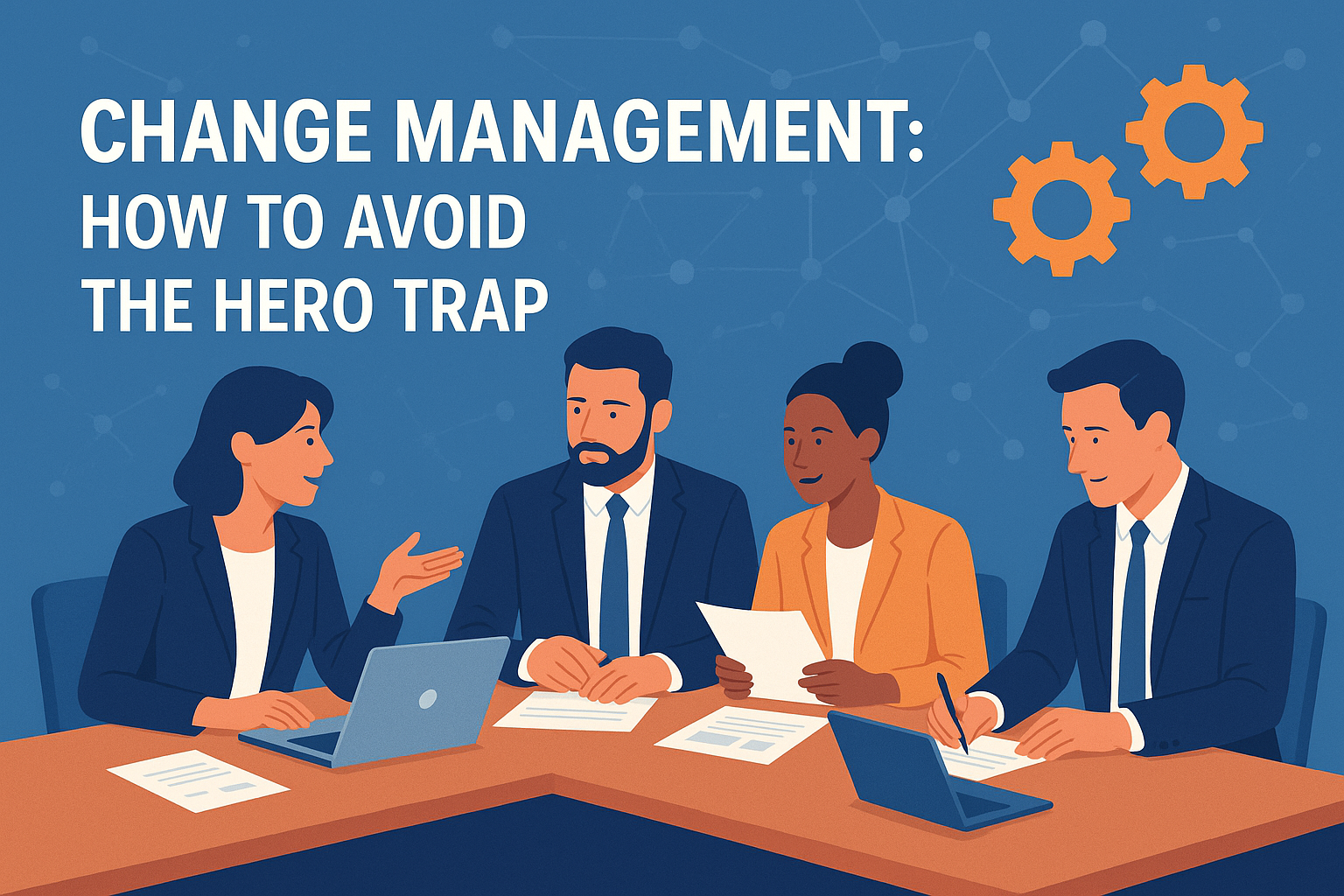Your basket is empty
Already have an account? Log in to check out faster.
Already have an account? Log in to check out faster.

Building Sustainable Change Without Burning Out Your Best People
In every organization undergoing change, there's a familiar story that plays out. A crisis emerges, deadlines loom, and someone steps up to save the day. They work late nights, skip weekends, and single-handedly pull the project across the finish line. Leadership celebrates them as a hero, and everyone breathes a sigh of relief.
The hero trap occurs when organizations become dependent on individual "heroes" to drive change initiatives forward. These are the people who consistently go above and beyond, fixing problems, filling gaps, and rescuing failing projects. While their dedication seems admirable, this dynamic creates a dangerous cycle that undermines sustainable change.
When you rely on heroes, you're not building capability—you're masking dysfunction.
Heroes can't maintain their pace forever. The constant pressure to rescue projects leads to exhaustion, decreased performance, and eventually, departure. When your hero leaves, they take all that critical knowledge and problem-solving ability with them.

When one person becomes the go-to expert, knowledge doesn't spread across the team. Others stop developing skills because "Sarah will handle it" or "Just ask Marcus." This creates dangerous single points of failure in your change process.
Heroic interventions treat symptoms, not causes. If someone is constantly firefighting, the organization never addresses the root issues that created the fires in the first place. The same problems recur, requiring yet another heroic rescue.
Nothing is more demoralizing than watching a colleague shoulder an unfair burden while you feel powerless to help. The hero trap creates resentment, dependency, and learned helplessness across teams.

Sustainable change management requires robust systems that don't rely on any single person. Document processes, create playbooks, and establish clear workflows that anyone can follow. When success depends on the system rather than individual heroics, you've built something that scales.
Change initiatives should have multiple leaders at different levels. Create a network of change champions rather than appointing a single change manager. This distributes knowledge, builds broader capability, and ensures continuity when people move on.
Heroes emerge when problems fester unnoticed until they become crises. Implement early warning systems, regular check-ins, and transparent reporting that surfaces issues while they're still manageable. Prevention beats intervention.
Pay attention to what you recognize and reward. When you celebrate the person who worked all weekend to fix a crisis, you incentivize crisis creation. Instead, celebrate teams that delivered smoothly, identified risks early, or improved processes to prevent future problems.
Don't just train one expert—build expertise across the team. Rotate responsibilities, pair people on challenging tasks, and create opportunities for knowledge sharing. When everyone has the skills to handle challenges, no single hero is needed.
People need to feel safe admitting they don't know something or asking for help. Heroes often emerge because others fear looking incompetent. Build a culture where asking questions is encouraged and mistakes are treated as learning opportunities.
For every critical role in your change initiative, identify who could step in tomorrow. Not in six months after extensive training—tomorrow. If you can't answer this question, you're in the hero trap.
Leaders play a crucial role in either enabling or preventing the hero trap. When a leader says "I don't know what we'd do without you," it might sound like a compliment, but it's actually an admission of organizational failure.
Effective change leaders should:
The transition away from hero-based change management isn't easy. Your current heroes might resist because their identity and value are tied to being needed. Others might worry about losing their competitive advantage.
But here's the truth: the real heroes in change management are the ones who make themselves unnecessary. They build systems, develop others, and create sustainable processes that outlive their involvement.

Change is hard enough without building it on a foundation of individual heroics. When you avoid the hero trap, you create change that's sustainable, scalable, and resilient. You build teams that are capable, confident, and collaborative.
The next time someone proposes to "just let Alex handle it," pause and ask: are we building capability or creating dependency? Are we solving the problem or masking it?
Because sustainable change doesn't need heroes. It needs systems, teams, and cultures that make the extraordinary ordinary.
That's not just better change management—it's better business.

Don’t miss this opportunity to upgrade your HR operations and join the growing list of businesses in Sri Lanka achieving success with GalleryHR.
GalleryHR is committed to helping Sri Lankan businesses thrive with smarter, more efficient HR solutions. Partner with us today and experience the difference.
Join our empire today!































0 comments